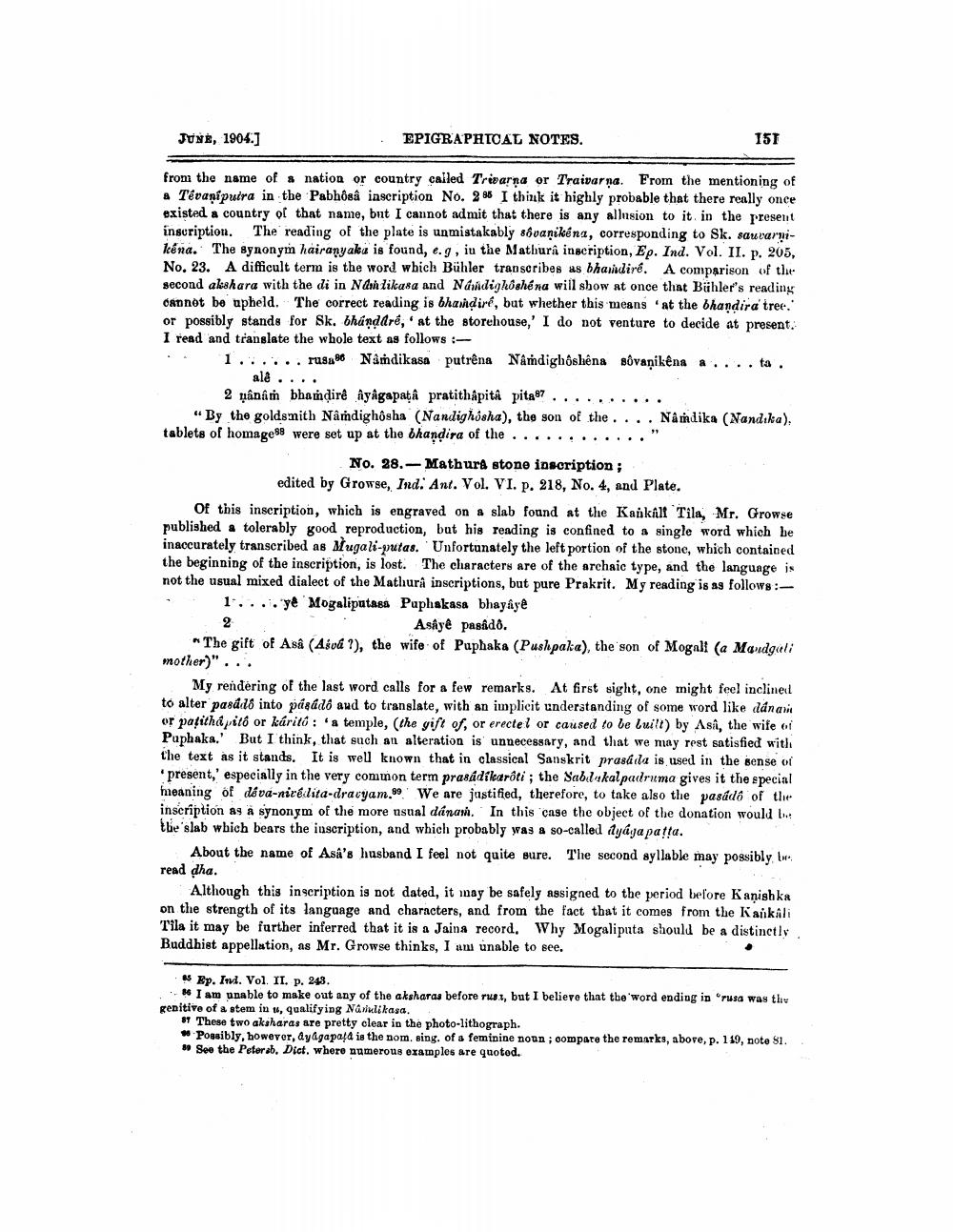________________
JUNË, 1904.]
EPIGRAPHICAL NOTES.
151
from the name of a nation or country called Trisarna or Traivarna. From the mentioning of a Tévanipuira in the Pabhôså inscription No. 285 I think it highly probable that there really once existed a country of that name, but I cannot admit that there is any allusion to it in the present inscription. The reading of the plate is unmistakably svaņikéna, corresponding to Sk. sauvarnikena. The synonym hairanyaka is found, e.g, iu the Mathura inscription, Ep. Ind. Vol. II. p. 205, No. 23. A difficult term is the word which Bühler transcribes as bhadiré. A comparison of the second akshara with the di in Narilikasa and Náradigkóshéna will show at once that Bühler's reading oannot be upheld. The correct reading is bhadiré, but whether this means at the bhandira tree, or possibly stands for Sk. bhándare, at the storehouse,' I do not venture to decide at present. I read and translate the whole text as follows :.. 1..... rusa86 Námdikasa putrêna Nandighôshêna svanikena a.... ta.
ale .... 2 nânî bhamdirê âyâgapatâ pratithâpitê pita87 ...... "By the goldsmith Nândighôsha (Nandighósha), the son of the .... Nardika (Nandika), tablets of homage88 were set up at the bhandira of the ............
No. 28.- Mathura stone inscription ;
edited by Growse, Ind. Ant. Vol. VI. p. 218, No. 4, and Plate. Of this inscription, which is engraved on a slab found at the Kankalt Tila, Mr. Growse published a tolerably good reproduction, but his reading is confined to a single word which be inaccurately transcribed as Mugali-putas. Unfortunately the left portion of the stone, which contained the beginning of the inscription, is lost. The characters are of the archaic type, and the language is not the usual mixed dialect of the Mathura inscriptions, but pure Prakrit. My reading is as follows:- 1.... ye Mogaliputasa Paphakasa bhayâyê
Asayê pasado. *The gift of Asâ (Agud ?), the wife of Puphaka (Pushpaka), the son of Mogndi (a Mandali mother)"...
My rendering of the last word calls for a few remarks. At first sight, one might feel inclined to alter pasado into pasado and to translate, with an implicit understanding of some word like dánari or pațithápito or káritó: a temple, (the gift of, or erectel or caused to be built) by Asâ, the wife of Paphaka.' But I think, that such an alteration is unnecessary, and that we may rest satisfied with the text as it stands. It is well known that in classical Sanskrit prasáda is used in the sense of
present,' especially in the very common term prasádíkarôti; the Sabilskal padruma gives it the special meaning of dáva-niré lita-dracyam.89' We are justified, therefore, to take also the pasádô of the inscription as a synonym of the more usual dánan. In this case the object of the donation would be the slab wbich bears the inscription, and which probably was a so-called dyáza patta.
About the name of Asâ's husband I feel not quite sure. The second syllable may possibly w read dha.
Although this inscription is not dated, it may be safely assigned to the period before Kanishka on the strength of its language and characters, and from the fact that it comes from the Kankali Tila it may be further inferred that it is a Jaina record. Why Mogalipata should be a distinctly Buddhist appellation, as Mr. Growse thinks, I am unable to see.
5 Ep. Ind. Vol. II. p. 243.
#6 I am unable to make out any of the aksharas before russ, but I believe that the word ending in rusa was the genitive of a stem in 1, qualifying Näriulikasa.
* These two aksharas are pretty clear in the photo-lithograph. * Possibly, however, Ayagapatd is the nom. sing. of a feminine noun; compare the remarks, above, p. 119, note $1. * See the Peter ab. Dict, where numerous oxamples are quotod.




